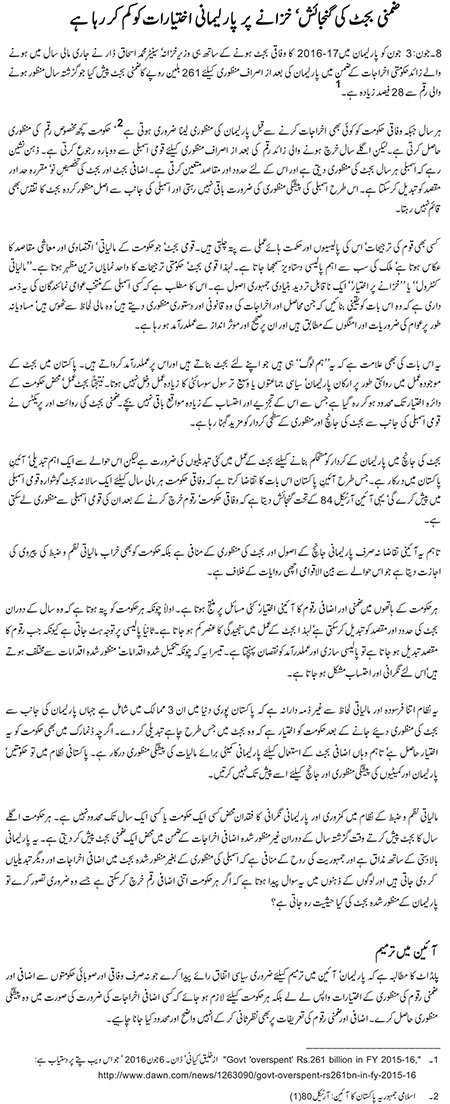June 08; While the Parliament was presented the Federal Budget 2016-2017 on June 03, soon after, the Finance Minister, Senator Muhammad Ishaq Dar sought the Parliament’s post-facto approval for a Rs. 261 billion ‘supplementary budget’ to cover governmental expenditure overruns in the outgoing fiscal year which was almost 28% higher than the figure approved last year. 1
Every year, while each Federal Government must seek Parliamentary consent on Federal Budget before any spending, 2 the Government receives the assent for x amount of money but returns next year to the National Assembly to ask for an additional spent amount for its post-effect approval. Consider that the Assembly passes the budget each year that prescribes limits and purpose. The additional budget and re-appropriation can change the prescribed limit and purpose. Prior approval of the Assembly is therefore, not required and hence the sanctity of the original budget passed by the Assembly is lost.
The priorities of any nation are reflected in its policies and strategies. The national budget, representing the Government’s fiscal, financial and economic objectives, serves as the most important policy document of a county. The national budget, therefore, is the single most important manifest of governmental priorities. “Power over purse strings” or the “power of the purse” is an incontestable democratic fundamental. This essentially means that there is an obligation on elected representatives of the people in an Assembly to ensure that all revenue and spending measures they authorize, legally and constitutionally, are fiscally sound, match the needs and aspirations of the population with equity, and that they are being implemented appropriately and efficiently. It further symbolizes that it is “we the people” who make and implement the budget for themselves. Pakistan’s current budgetary process has traditionally attracted little input from parliamentarians, political parties or wider civil society. The budget process has, in consequence, become solely the domain of the Government, leaving little scope for analysis or accountability. The culture and practice of supplementary budget further erodes even the cosmetic role of the National Assembly in scrutiny and passage of the budget.
To strengthen Parliament’s role in Budget scrutiny requires many reforms with the budget procedures but a major reform, in this case, is required in the Constitution of Pakistan. Just as the Constitution of Pakistan requires that the Federal Government present an annual budget statement to the National Assembly in respect of each financial year, the same Constitution, through Article 84, also suggests that the Federal Government has the power to spend amounts and get an ex-post (after spending the money) approval from the National Assembly.
This constitutional provision, however, runs contrary not just to the principle of Parliamentary scrutiny and approval of budget but also allows the Government to follow bad fiscal discipline contrary to leading international good practices in this regard.
This constitutional power of supplementary and excess grants in the hands of each Government results in many problems. Firstly, the seriousness in the budget making is reduced since each Government knows it can increase the budgetary limits or change the purpose during the year. Secondly, the focus on policy is lost. Policymaking and implementation is hampered once the purpose of funds is changed. Thirdly, monitoring and accountability becomes difficult since the executed initiatives may differ from approved initiates.
So archaic and fiscally-irresponsible is this system that Pakistan is among the only 3 countries in the world that provide this power to Governments of changing the budget in almost any manner after budget passage by a Parliament. In Denmark, while the Government has this power, it still requires prior approval of the parliamentary committee of the finance in order to use excess budget. In Pakistan’s system, Governments do not even submit to this oversight and prior approval by Parliament and Committees.
The weakness in the system of fiscal discipline and lack of Parliamentary oversight is not limited to just one Government or one year. Each Government merely presents a supplementary budget after incurring the unauthorized extra expenses during the previous year at the time of presenting the next year’s budget. It is a mockery of parliamentary supremacy and runs counter to the spirit of democracy that excess spending and other changes in the approved budget are made without the prior approval of the Assembly and prompt citizens to raise the question, what, after all, is the sanctity of Parliament’s approved budget if each Government can spend as much extra as it deems necessary?
Amendment in Constitution: PILDAT demands that the Parliament must create the necessary political consensus to amend the Constitution to not just take away the powers of excess and supplementary grants from Federal and Provincial Governments but also make it incumbent upon each Government to seek ‘prior’ approval in case any extra expenditure is required. The definitions of excess and supplementary grants must also be revised to be stringent and precise in scope.
References:
1. Govt ‘overspent’ Rs.261 billion
in FY 2015-16,” Khaleeq Kiani, DAWN. June 06, 2016.
http://www.dawn.com/news/1263090/govt-overspent-rs261bn-in-fy-2015-16







